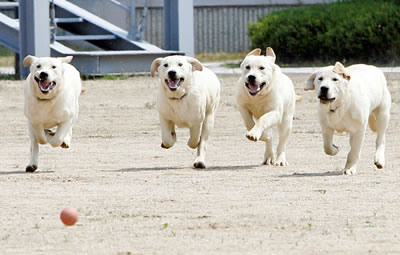Science Fiction
Dictionary
A B C D E F G H I J K L M N O P Q R S T U V W X Y Z
Korean Cloned Drug-Sniffing Dogs

The South Korean Customs service is training seven cloned Labrador retrievers in the fine art of serving as a drug-sniffing canine. The dogs were born six months ago after being cloned from a drug-sniffing dog in active service.

(From 'Toppy' Cloned Korean drug-sniffing dogs)
If you think it's expensive to clone dogs, you're right; each dog cost from $100,000 $150,000 to clone from the source DNA. But here's the rest of the story.
First, only about one dog in ten can pass a behavior test to determine if they are genetically qualified to be a sniffing dog. All seven of the cloned dogs passed the test.
Second, only about thirty percent of the selected dogs can actually pass the full training regimen, which costs about $40,000 per dog (pass or fail).
All of the dogs are called 'Toppy' - a combination of 'tomorrow' and 'puppy.'
Science fiction fans might consider this to be a commercial business use of the RePet technovelgy used in the film The Sixth Day, released in 2000. See the RePet infomercial video below.
(RePet infomercial from 'The Sixth Day')
The cloning research and work was done by a team of Seoul National University scientists led by Professor Lee Byeong-chun. Now, if only they could master syncording, which is the fictional technology in The Sixth Day that assured that your new RePet was behaviorally identical to your old pet, they wouldn't even need to train them!
Read also about Cloned Cats Have 9+n Lives; don't forget Bokanovsky's Process, a very early description of cloning from Brave New World.
Story via South Korea to use cloned dogs to sniff for drugs and explosives; thanks to Moira for finding this story and the sf reference.
Scroll down for more stories in the same category. (Story submitted 4/27/2008)
Follow this kind of news @Technovelgy.| Email | RSS | Blog It | Stumble | del.icio.us | Digg | Reddit |
Would
you like to contribute a story tip?
It's easy:
Get the URL of the story, and the related sf author, and add
it here.
Comment/Join discussion ( 0 )
Related News Stories - (" Biology ")
Black Fungus Blocks Radiation
'You were surrounded by Astrophage most of the time' - Andy Weir, 2021.
Lunar Biorepository Proposed For Cryo-Preservation Of Earth Species
'...there was no one alive who had ever seen them. But they existed in the Life Bank.' - John Varley, 1977.
Let's Make Slaver Sunflowers! Engineering Plants To Reflect Light
'The mirror-blossom was a terrible weapon.' - Larry Niven, 1965.
Machete-Wielding Philodendron Isn't Going To Take It Anymore
'The tree ended its wild larruping, stood like a dreaming giant liable to wake into frenzy at any moment.' - Eric Frank Russell, 1943.
Technovelgy (that's tech-novel-gee!) is devoted to the creative science inventions and ideas of sf authors. Look for the Invention Category that interests you, the Glossary, the Invention Timeline, or see what's New.
Science Fiction
Timeline
1600-1899
1900-1939
1940's 1950's
1960's 1970's
1980's 1990's
2000's 2010's
Current News
The New Habitable Zones Include Asimov's Ribbon Worlds
'...there's a narrow belt where the climate is moderate.'
Can One Robot Do Many Tasks?
'... with the Master-operator all you have to do is push one! A remarkable achievement!'
Atlas Robot Makes Uncomfortable Movements
'Not like me. A T-1000, advanced prototype. A mimetic poly-alloy. Liquid metal.'
Boring Company Drills Asimov's Single Vehicle Tunnels
'It was riddled with holes that were the mouths of tunnels.'
Humanoid Robots Tickle The Ivories
'The massive feet working the pedals, arms and hands flashing and glinting...'
A Remarkable Coincidence
'There is a philosophical problem of some difficulty here...'
Cortex 1 - Today A Warehouse, Tomorrow A Calculator Planet
'There were cubic miles of it, and it glistened like a silvery Christmas tree...'
Perching Ambush Drones
'On the chest of drawers something was perched.'
Leader-Follower Autonomous Vehicle Technology
'Jason had been guiding the caravan of cars as usual...'
Golf Ball Test Robot Wears Them Out
"The robot solemnly hit a ball against the wall, picked it up and teed it, hit it again, over and again...'
Boring Company Vegas Loop Like Asimov Said
'There was a wall ahead... It was riddled with holes that were the mouths of tunnels.'
Rigid Metallic Clothing From Science Fiction To You
'...support the interior human structure against Jupiterís pull.'
Is The Seattle Ultrasonics C-200 A Heinlein Vibroblade?
'It ain't a vibroblade. It's steel. Messy.'
Roborock Saros Z70 Is A Robot Vacuum With An Arm
'Anything larger than a BB shot it picked up and placed in a tray...'
A Beautiful Visualization Of Compact Food
'The German chemists have discovered how to supply the needed elements in compact, undiluted form...'
Bone-Building Drug Evenity Approved
'Compounds devised by the biochemists for the rapid building of bone...'
